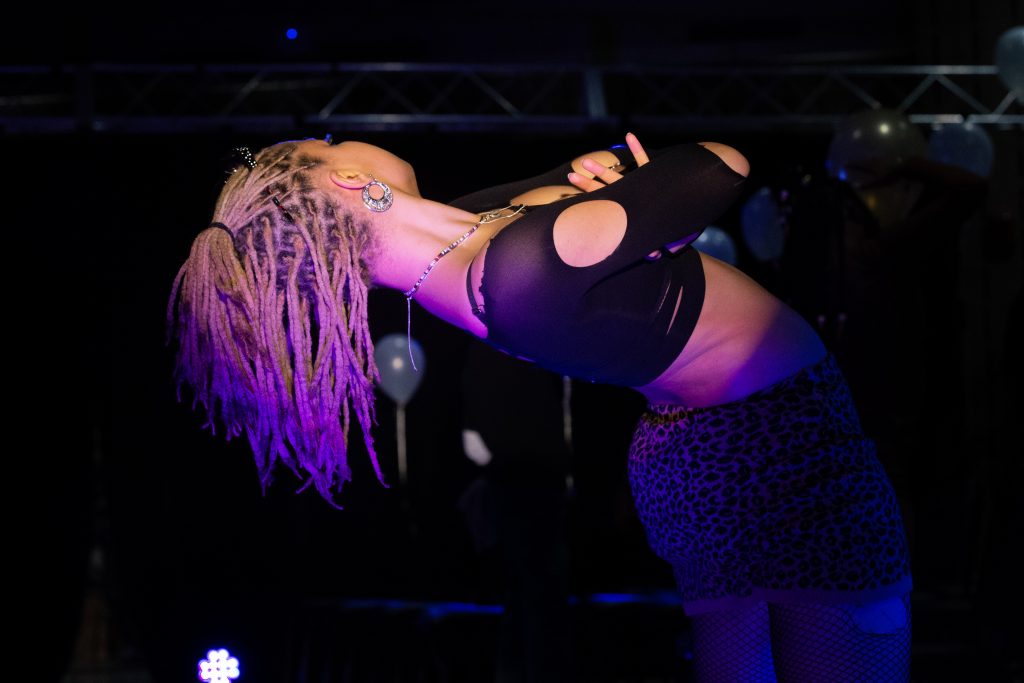This past Saturday, Binghamton University’s Black Student Union (BSU) held its annual hair show.
Held in the Fountain Room of the Innovative Technologies Complex, the show was one of BSU’s last events for Black History Month. The BSU had designated each week of the month a separate phase — deconstruction, then reconstruction and rebirth, followed by joy and perseverance. The Hair Show, the second-to-last event planned by the BSU for the month, was meant to celebrate the complexity and diversity of Black hair.
The event kicked off with poetry, beginning with Racquel Whittingham, a sophomore majoring in nursing, who read a poem titled “More Than Hair.” Each poem was performed by a member of Vanguard, a publication organized by BSU.
“Monday braids, Tuesday buns, Wednesday locks — ooh this is so fun,” Whittingham read. “This is the expressionism in a bodily form and our pride is taken from it just because it’s not the norm. Now let me ask you, do you like how my hair flows in the wind? How about when it grazes against your skin?”
Whittingham’s poetry was followed by another poem titled “Afro Girl,” and then “The Future of My Afro” by Mikal “MiKelangelo” McKay, a senior majoring in English. In his poem, McKay described a future where Black hair and culture would be respected.
“I want to tell you all about a future,” McKay said. “A future where everything is Afro-centric — well, everything already is, but in this future Black people are properly commended. Our stories and their creators are correctly represented. Our creations never have a chance to be disrespected. The children with the afros are the real models of the blessed. This is a future where our hair could grow as high as God’s toes and there’s no enemies or foes, just fun competitions and friendly rivals.”
The hair show was split into four scenes through the night. Before the first showing, titled “Afro Punk,” Elizabeth Plantin, BSU’s publications coordinator and junior majoring in English, asked the crowd to call out what “Afro Punk” meant to them. The crowd called out responses like “rockstar,” “rage” and “freedom.”
“‘Afro Punk’ is apparently the definition of Black people taking up alternative music, alternative styles, rock life and all of that, but I think it’s a lot more than that,” Plantin said. “I think ‘Afro Punk’ is a true definition of Black people really encompassing rage, rebellion, freedom and what it means to be a Black woman and a Black man.”
Afro Punk consisted of five performers, each emerging from behind a curtain and walking down the runway. The performers danced to songs like “OHFR?” and “Roof” by Rico Nasty, and “Beef” by FloMix, before striking a pose in front of the audience and pausing while the other performers entered.
The end of Afro Punk’s performance was met with applause, and another question posed by the BSU E-Board to the audience — this time asking what words came to mind when they heard the word “sensual.” The crowd called out words like “beauty,” “vogue” and “sex appeal.” According to BSU organizers, the next scene was meant to demonstrate the beauty and meaning of Black hair.
“Sensual” consisted of eight performers. To kick off, two models entered and danced slowly to the tune of “Mount Everest” by Labrinth. They were followed by performers that danced to songs like “That Way” by Wale, feat. Jeremih and Rick Ross.
The next scene was titled “Old School,” meant to encompass aspects of earlier Black culture, love and music, featuring songs from artists like Biggie Smalls, DMX and 2Pac. The event featured a variety of hairstyles, including replication of a ponytail hairstyle used by members of American girl group TLC.
Among the performers was Kiya Floyd, senior adviser of BSU and senior majoring in mechanical engineering, who had performed twice through the night.
“I joined the show because I didn’t see a lot of male representation in it, and I wanted to be that part,” Floyd said. “All of our hair styles should be celebrated.”
Floyd described one of his performances, “Vixen,” in which he had performed along with another model. Floyd said the event offered him a new way to express himself.
“Both of them I kind of wanted to step out of my comfort zone,” Floyd said. “I’m a pretty laid back, chill guy, I don’t really do stuff like this. I just wanted to do something different, I really wanted to challenge myself and the dance and all that I’m not used to doing — so why not? And also just coming into my body and feeling comfortable in my skin so I showed a little bit of skin this scene, just to go out with a real, real good bang.”
Before the final scene, two competitions, including a hair braiding contest, were held for a raffle ticket, with Whittingham among the winners.
Kayla Roache, public relations coordinator of the Juvenile Urban Multicultural Program (JUMP) and a senior majoring in history, also attended the event. Roache said the event provided important recognition for Black women, often discouraged in the presentation of their hair.
“Being able to represent our hair in creative ways is definitely very good for our presentation, and I am very grateful that BSU has put this show on, especially in a [predominantly white institution (PWI)], to give us that experience of showing the beauty of Black hair,” Roache said.
Plantin said the event served as a way to highlight and remember the progression of Black hair through the years.
“Throughout the many revolutions that we had, throughout the many changes that we had, Black hair embodies more than just what we have on our heads,” Plantin said. “For a lot of Black people, it’s the crown we have on our heads that people first see — and it tells a story.”



